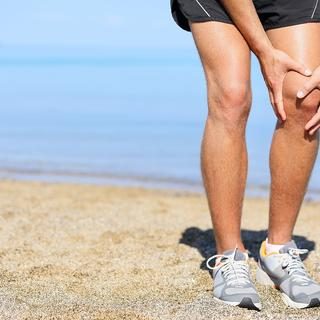Energy & Stamina - they're crucial in getting you over the finish line in any high intensity sport or endurance race. How do you keep stamina & energy levels high throughout an event? What are people doing wrong that you should be avoiding? Let's take a closer look...
Mistake #1: Not understanding the difference between Hydration & drinking water.
Hydration means using electrolytes or salts to effectively get the water into your cells. Hydration of cells sustains your ATP or energy production. It can seem to give you a "second wind" if you're tired, but keeping hydrated ultimately means preventing DEHYDRATION. Once Dehydration sets in during an endurance event, it can be an exponential effect, difficult to recover from.
Drinking water on its own, can seem to go straight through you. If you're only drinking water in your training sessions and on race day, expect to be much more lethargic and feel heavy on foot.
Tip: Calculate and include your electrolytes as carb intake per hour
Tip: Pre-mix your water & electrolytes and keep in your support box with support crew.
Tip: Keep some plain water separate in your support box - sometimes you do get sick of the electrolytes and especially if you have an upset stomach, resting on the electrolytes and drinking some plain water is a rest for your stomach.
Tip: Read more about Hydration here. and here
Mistake #2: Not drinking prescriptively
A BIG mistake is when people think they'll just listen to their body's signals. If you're thirsty, you're already dehydrated. Add a hot sunny day into the mix and you'll be dehydrated without even noticing it.
There is no "as I feel like it" when it comes to drinking and hydration in Endurance racing. Without water and fluid intake you will dehydrate in minutes. Humans are not camels, we must frequently sip water to survive.
Tip: It's not just about how you drink, but how much and when. Smart Endurance racers drink prescriptively. It's a specific quantity of fluids with electrolytes included. Fluid Intake must be 600-800ml/hr
Tip: Get pedantic about it - a good regime is to sip every 15 min and also in between as needed. Based on this quantity of fluids, it's like drinking almost a metric cup every 20 min.
Tip: If you're forgetful or get sidetracked chatting with your team, set a timer on someone's phone for 20 min intervals until you get the hang of frequency.
Mistake #3: Not eating prescriptively
Food, as with Hydration must be prescriptive.
If you don't eat frequently enough, you may run out of glycogen stores, which means you're dangerously close or about to "hit the wall".
If you don't eat types of food that your body can tolerate, you can feel nauseous, bloated, have stomach cramps or worse, start vomiting.
Tip: Food isn't the same for everyone. You need to Test out in Training foods that agree with you. Eliminate those that make you feel queasy. If you're gluten free or Coeliac, then you really need to get this right and the only way to find out is in Training.
Tip: Food taken prescriptively should be 100-110g carbs per hour. Other people advise much less than this, but remember, you need to prevent glycogen depletion - Prevention is king!
Tip: Read more about eating Carbs during your event here.
Mistake # 4: No tolerance for pain
If you have NOT been doing the hard yards in training, you will have no reference point for the kind of discomfort you will be experiencing on race day. If you assume you'll be ok, without safely testing your limits in training, it can really be a demoralising blow to the ego - and you don't want that shock on your big day! We're not saying be cruel to yourself, but test your limits and build up that tolerance.
Tip: In training, you want to be experiencing discomfort (mild, moderate) and see how you respond to it physically, mentally & emotionally. Regroup after longer training sessions and tweak your nutrition, strapping of feet/injuries, hydration to improve your comfort next time.
Tip: You want to stay as positive and upbeat as you can, rather than waste your energy on dealing with the shock and mental games that go with the unexpected. Think ahead, always be prepared for anything that could happen.
Mistake # 5: Not managing pain
Pain can definitely drain your energy. People in chronic pain are often exhausted and tired, without doing such an event as Endurance. So when you are asking a lot of your body during an Endurance race, why spend more energy on ignoring or suffering the consequences of minor niggles and pain?
Tip: Take Panadol alternating with Nurofen as a preventative. It's safe as a preventative for inflammation & minor pain for the average person with no pre-existing conditions. The suggestion is take 2 Panadol, wait 6 hrs. Take 2 Nurofen, wait 6 hours. Repeat this alternating prescription. Seek advice from your doctor to double check.
Tip: When already in pain, take 2 panadol or nurofen, as long as you haven't taken it in past 1hr-2hrs. This should be for any niggle that isn't blister related, such as knee, hip or back pain.
Mistake #6: Thinking you can do it on your own.
Being alone with your thoughts can be the worst drain on your stamina. The games the mind plays when you're tired, in pain and grumpy plays out as a downward spiral of misery. Working together with your team and feeling included is essential to a fun and energetic race.
There's a reason why endurance events are often run in teams. You need the support & cameraderie to keep your spirits high and lifted to push through boundaries of pain and discomfort.
Tip: Check in with each other about how you're going. Pain levels, tiredness, when you need breaks and if you suffer an injury. Being honest and being upfront means your team can do something about it sooner rather than later.
Tip: Have some kind of strategy for dealing with the unexpected & discuss with your teammates before race day. I discuss more about teamwork in this blogpost.
Thanks & Acknowledgements: Toby Cogley, a multiple time Oxfam Trailwalker veteran has shared his experiences with me and many other teams & support crews entering such endurance events. To read an article he wrote for Oxfam Trailwalker click here. Thankyou Toby for your generosity & knowledge.
To speak to our Functional Nutritionist about your needs for Endurance, call us on 9938 1090 today.
[btnsx id="429"]


